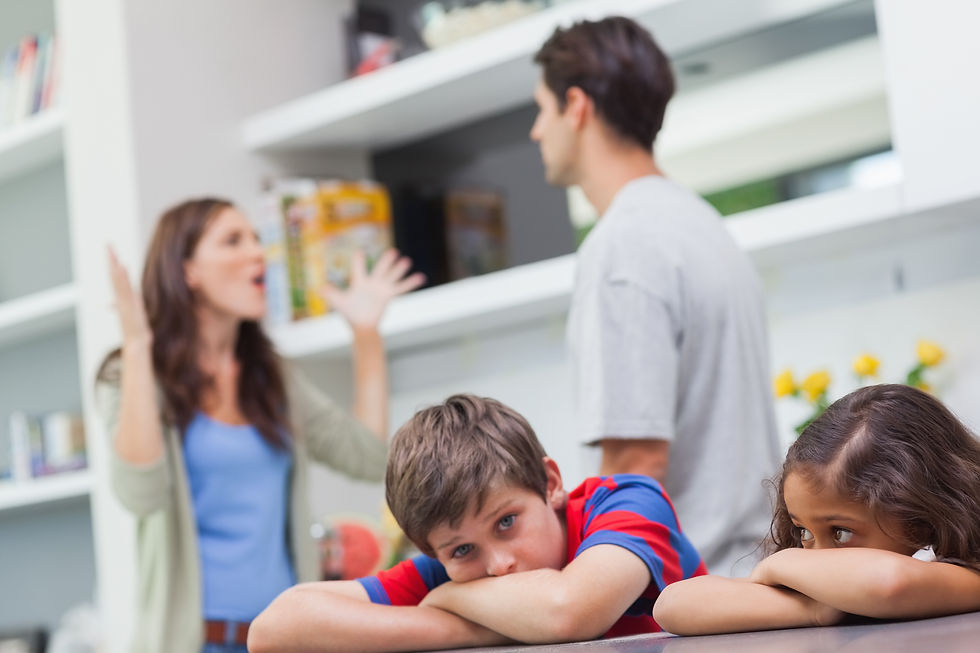"The Silent Storm: Unveiling the Impact of Parental Conflict on Children"
- United-in-Separation
- Jul 25, 2023
- 4 min read
Updated: Aug 5, 2023

Once upon a time, in a peaceful suburban neighbourhood in Kent, lived a family with two young children, Emma and Lucas. Their parents, Sarah and David, loved them dearly and always strived to provide a nurturing environment. However, beneath the surface, a storm was quietly brewing – the storm of parental conflict.
Sarah and David were both strong-willed individuals, each with their own set of expectations and opinions. While their love for their children was undeniable, their inability to resolve conflicts in a healthy manner cast a dark cloud over the household. They failed to realise the profound impact their conflicts were having on their innocent children.
A typical evening in the household was akin to walking on thin ice. As Emma and Lucas played in their room, they could hear the muffled sounds of their parents' raised voices drifting through the walls. Their little hearts filled with anxiety and confusion. They wondered why the two people they loved most couldn't seem to get along.
The children often witnessed heated arguments, sometimes escalating into hurtful words or even door-slamming. These battles left deep scars that couldn't be erased. Emma and Lucas would retreat to their rooms, silently absorbing the tension and fear, feeling helpless and lost.
As time went on, the children began to internalise the conflict. Emma's once cheerful demeanour slowly faded, giving way to anxiety and a constant need for reassurance. Lucas, on the other hand, became withdrawn, seeking solace in his own world of books and video games. The very foundation of their security, their home, had become a battleground.
The destructive patterns of parental conflict began to shape their young minds. Emma and Lucas struggled with their emotional well-being, experiencing difficulty in forming healthy relationships with their peers. They found it challenging to trust others, fearing that conflicts would inevitably arise, leading to abandonment and heartache.
Moreover, the children started to imitate their parents' behaviour. Emma, at school, would often engage in arguments with her classmates, mirroring the aggression she had grown accustomed to witnessing at home. Lucas, too, internalised the anger and would lash out in frustration, unable to contain the overwhelming emotions that welled up within him.
Recognising the detrimental effects of their parental conflict, Sarah and David decided it was time for a change. They sought professional help, attending parental conflict coaching sessions to learn healthy communication and conflict-resolution techniques. They realised that their children's emotional well-being depended on their ability to create a harmonious environment.
Over time, Emma and Lucas noticed a shift in their parents' behaviour. The once stormy atmosphere gradually transformed into a calm sea. Sarah and David began to actively listen to each other, setting aside their differences in favour of compromise and understanding. The children witnessed love and respect being restored, like a gentle breeze that brings solace after a storm.
As the wounds began to heal, Emma and Lucas started to flourish. With their parents leading by example, they learned the importance of open, honest communication and the power of empathy. Their anxieties began to subside, and they regained their confidence, knowing that conflicts could be resolved without resorting to anger and hurtful words.
The impact of parental conflict on children is profound, leaving lasting scars that can shape their lives. Parenting is a challenging journey, but it is crucial for parents to recognise that their love alone cannot shield their children from the destructive consequences of unresolved conflict.
By acknowledging the destructive patterns of parental conflict and taking proactive steps to resolve conflicts in a healthy manner, parents can protect their children from unnecessary emotional distress.
It is essential for parents to create a safe and nurturing environment where open communication is encouraged. By promoting dialogue, parents can teach their children the art of compromise and problem-solving. They can demonstrate that conflicts are a natural part of life, but they can be resolved with respect, empathy, and understanding.
Parents must also be mindful of the impact their actions have on their children. Even when disagreements arise, it is crucial to shield children from heated arguments and never involve them in adult conflicts. Instead, parents should strive to present a united front, (hence United-in-Separation), offering a sense of stability and security to their children.
Seeking professional help can be tremendously beneficial as well. Family therapy, Parental Conflict Coaching or Counselling provides a neutral space where parents can learn effective communication techniques and gain insights into their own behaviours. These interventions can break the cycle of destructive conflicts and help parents build healthier relationships, not only with each other but also with their children.
As Sarah and David continued their journey of healing, they witnessed remarkable changes in their children. Emma's anxiety slowly dissipated, and she blossomed into a confident and compassionate young girl. Lucas, no longer burdened by the weight of unresolved conflicts, discovered his own voice and began to thrive academically and socially.
The storm of parental conflict had left its mark on Emma and Lucas, but through their parents' commitment to change, they found hope and healing. Sarah and David's love for their children drove them to recognise the destructive patterns and make a conscious effort to break free from them.
The story of Emma and Lucas serves as a reminder to all parents of the profound impact their conflicts can have on their children's well-being. Love alone is not enough; it must be accompanied by healthy communication, conflict resolution, and a nurturing environment.
Let us strive to create homes where conflicts are resolved with empathy and understanding, where children can grow and flourish without the shadows of parental discord. By doing so, we can pave the way for a brighter and happier future for our children, where they feel safe, loved, and free from the silent storms of parental conflict.




Comments